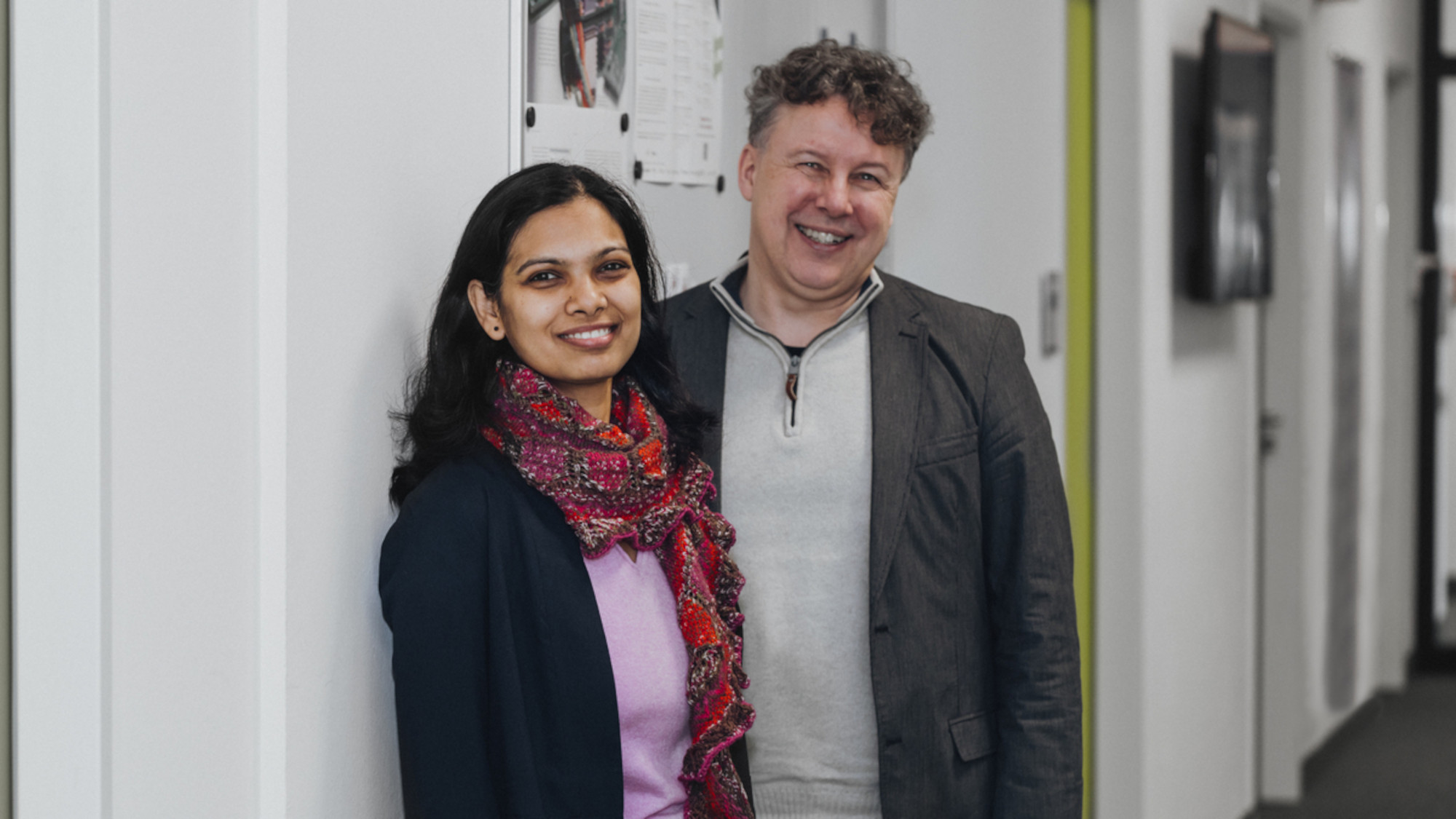
© Matej Meza / Universität Bremen
Decoding a Decade
Kamalika Datta’s Academic Journey from India to Germany
In 2013, Kamalika Datta made her first journey from India to Germany to participate in a project funded by the German Academic Exchange Service (DAAD) at the University of Bremen. Today, a decade later, she is not only an integral part of Professor Rolf Drechsler’s Group of Computer Architecture research team but also a member of a Bremen delegation for a new DAAD project in collaboration with an Indian university.
The roots of collaboration between Dr. Kamalika Datta and Professor Rolf Drechsler trace back to 2012. They first met during a conference at the Indian Institute of Engineering Science and Technology in Kolkata. They quickly identified synergies in their research fields, particularly in the area of reversible computing. Kamalika Datta recalls, “Our paths crossed at a technical conference. At that time, Rolf had already made numerous publications on this subject. It was a good opportunity to exchange ideas and develop joint proposals.”
The initial step in this direction took place in 2013 as part of the DAAD project, “Synthesis of Reversible Circuits using Probabilistic Methods and Functional Transformation.” Kamalika Datta participated from the Indian Institute of Engineering Science and Technology, then Bengal Engineering and Science University (BESU). She visited Bremen twice during the two-year project for a total of two months. The collaboration extended beyond the time Kamalika Datta was physically in Bremen. Despite spatial distance, they continued their research.
After completing her Ph.D. in 2014, Datta became a faculty member at the National Institute of Technology, Meghalaya, and remained in close contact with Rolf Drechsler. Datta emphasizes, “Even without explicit funding, it was essential for us to continue collaborating. Whenever an opportunity for funding arose, we applied.”
Datta and Drechsler’s research focuses on the areas of computational reversibility and quantum computing. The decision to enter this research field early paid off when, in 2016, major companies like IBM, Google, Rigetti Computing, IonQ, and others actively participated in the development of quantum computers. Datta reminisces, “We started working on this topic early and were often asked how it could be practically applicable. In 2016, our research field became a reality, and applications became more tangible than ever before.” Rolf Drechsler adds, “It was either very visionary or just luck. We worked on the fundamentals of this topic, and after 10 years, it became a mainstream topic.”
“We learn so much from different people from different countries and different Institutes. It not only expands our horizon but also helps to gain different perspectives on our research.” Kamalika Datta
Following stays in Singapore and India, Kamalika Datta’s postdoctoral position at the University of Bremen in 2021 marked another milestone in their joint research. By that time, Datta and Drechsler had already published more than 20 joint papers. Datta describes the transition to the University of Bremen as a significant yet easy step, saying, “Through years of research, I was already closely connected to Bremen, familiar with the places and culture. I was acquainted with the international team and looked forward to working on-site. Therefore, it was not a very difficult decision for me.”
Back to the Beginnings
In 2022, Kamalika Datta and Rolf Drechsler applied again for a DAAD project, this time in collaboration with the Indian Institute of Technology Kharagpur (IIT Kharagpur). She explains, “Our project’s focus was on the ‘Logic in Memory.’ Our goal is to develop tools to ensure the correctness of designs for emerging technologies.” Rolf Drechsler adds, “Typically, we build computers in the classical way, as found in all computing platforms including smartphones. There is a memory where data are stored, which interfaces with a processor. Meanwhile, data transfer occurs from memory to the processor and back. This often consumes more than 80% of the energy, essentially for just moving data back and forth in the computer. And that is the bottleneck which in-memory computing has the potential to tackle. In particular, we want to distribute the computation, by allowing the memory not only to store but also to perform computation. This would lead to better information processing on various computing devices.
For this DAAD project, Kamalika Datta embarks on another journey to India at the end of 2023, this time as a member of the Bremen delegation – exactly ten years after her first visit to Bremen. She reflects, “It was interesting to return home and, at the same time, be on business. This trip not only facilitated productive discussions about future projects but also provided a personal reflection on my academic journey over the past ten years.”
Relevance of International Collaboration
The longstanding collaboration across borders and time zones underscores the crucial role of international research in today’s scientific landscape. The challenges of the current era require a diversity of perspectives and skills, says Rolf Drechsler. He emphasizes, “The problems we address are extremely challenging. Therefore, it is of great importance that we all collaborate, bringing in diverse perspectives.”
Datta also highlights the importance of intercultural experiences: “We learn so much from different people from different countries and different Institutes. It not only expands our horizon but also helps to gain different perspectives on our research.” Datta’s role as a mentor and advisor in Professor Drechsler’s research team at the University of Bremen underscores this. Rolf Drechsler emphasizes, “With her expertise and leadership skills, she plays a key role in the group and advises new Master’s and Ph.D. students. That is extremely beneficial for the overall group.”
In a time when global challenges require interdisciplinary solutions, Kamalika Datta’s academic journey shows that collaboration across borders not only enables scientific progress but also enriches personal growth. Furthermore, the new stages of their collaboration promise not only relevant research but also a continued significant contribution to future international cooperation.